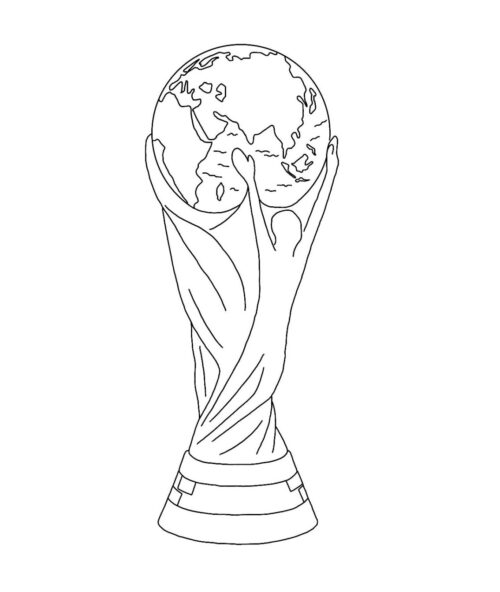Just one day after the Harvard-Yale Football Game, a different type of football competition will be played on the other side of the world. With equally impassioned fans and historic rivalries, the FIFA World Cup 2022 will be held in Qatar from November 20th until December 18th.
The World Cup is the highest-level competition for international men’s association football (or soccer) and takes place every four years between 32 qualifying nations. The tournament begins with a group stage, with eight groups of four teams. The top two teams from each group go through to the round of 16, beginning a simple knockout bracket to decide the World Cup Champion. Only eight nations have won the trophy in its 92-year history: Brazil, Germany, Italy, Argentina, France, Uruguay, England, and Spain. The total viewership is consistently in the billions, rivaled only by the Summer Olympics, and dwarfing the likes of the Super Bowl.
The competition looks strong this year, with no clear favorites to win. Brazil currently tops the FIFA world rankings, and with five World Cup titles, have historically been the most successful team. Relative to its group of Switzerland, Serbia, and Cameroon, Brazil demonstrates a high potential for victory. Brazilian student Carolina Bartunek ’25 claimed, “Brazil is going to win, period.” She emphasized that “football is everything in Brazil.”
France is the defending champion after winning its second World Cup title in 2018, although the teams has had some inconsistent results in recent Nations League matches. They will seek to dominate Australia and Tunisia and overturn their recent loss to a strong-looking Denmark.
England is coming off the back of their loss to Italy in the finals of the 16th UEFA European Football Championship that took place in summer 2021. Their recent results have also been disappointing, and manager Gareth Southgate’s recent choice of players have garnered criticism, but their surprising successes at the 2018 World Cup, where they placed fourth, and at Euro 2020, indicate a spirit that could take them farther than expected.
Matteo Wakeman ’26 champions Argentina, another historically successful team: “I think this is our year because this is the first time that the team has a lot of confidence.” This is likely the final World Cup for Lionel Messi, Argentina’s captain and seven time Ballon d’Or winner, so he will surely play a pivotal role in the team’s final result. . Cristiano Ronaldo, Messi’s longtime rival will be captaining Portugal for his last World Cup as well, so this competition is being seen as the end of an era of their domination as the greatest players. Belgium, Spain and Germany are the other powerhouses set to make an impact. Some sleeper picks include Senegal and Japan, the best teams from Africa and Asia respectively.
A notable absence from the competition is Italy, who won the UEFA Euro 2020, the biggest competition for European international football. They failed to qualify for the World Cup for the second consecutive time, demonstrating the high level of competition to qualify from European countries.
For a tournament that draws spectators from all around the world, the United States lacks serious support in men’s soccer. Soccer is considerably less watched than American football, baseball, basketball. American student Wellington Upstill ’25 demonstrated apathy toward American soccer, stating that while he was in Paris when France won the World Cup, “it was pretty cool, but otherwise soccer is a pretty lame sport.”
George Genieser ’25, a Londoner with American parents, commented, “Americans don’t like [association] football because they are bad at it.” He compared it to American football, where “no other country plays it, that’s why they like it.”
Indeed, the United States did not even qualify for the 2018 competition, but they are back now and better than ever. England, Wales, and Iran bring high competition, but a team full of promising young players will surely help the United States make a statement. Genieser pointed out that “realistically, the pivotal player is going to be Giovanni Reyna,” a 20-year-old from New York City playing for Borussia Dortmund, a sports club based in Bundesliga, Germany. Jointly hosting the 2026 World Cup with Mexico and Canada, the United States is likely to see an increase in appreciation and level of competitive soccer players in coming years.
Although the FIFA World Cup typically takes place in the summer months, this year’s later start date is due to Qatar’s extremely hot climate: with average daily highs of 107°F in June, it was seen as unsafe for the players and fans. This change in timing has caused some backlash from those who do not wish to interrupt the European club football season, a change that will force a turnaround of just a few days for club players in Europe to prepare for the World Cup and increase the potential for injuries and poorly-organized teams. However, expect plenty of dorm room watch parties at 10 am.
While Harvard-Yale reminds us of the historical rivalry with our New Haven neighbors, let the following month of international football competition remind us of the ability that sports have in bringing people together around the world.
Andrew Spielmann ’25 (andrewspielmann@college.harvard.edu) writes Sports for the Independent.

